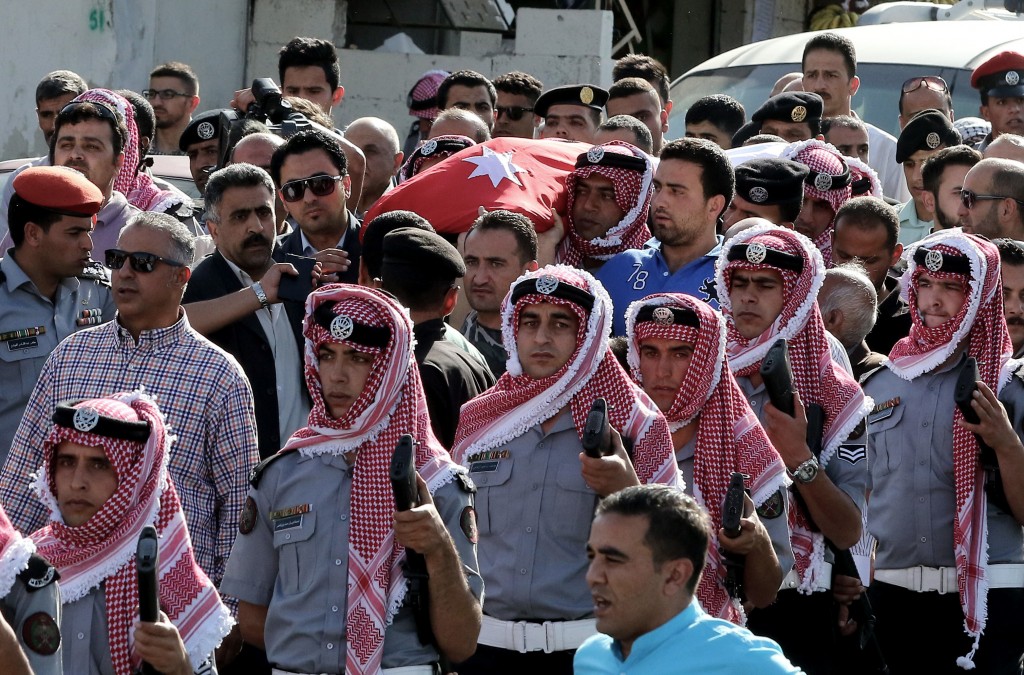
A gunman apparently acting alone killed the five Jordanian agents in a daylight “terrorist attack” on their office in a Palestinian refugee camp north of the capital. Jordan is a leading member of the US-led coalition fighting the Islamic State group in neighbouring Iraq and Syria, and has been the target of previous jihadist attacks.
/ AFP PHOTO /
by Kamal Taha with Mussa Hattar in Amman
BAQAA, Jordan (AFP) — Jordanian authorities have arrested a suspect accused of gunning down five intelligence agents on Monday in their office at a Palestinian refugee camp.
“Investigations are under way but early indications are that this was an isolated and individual act,” said government spokesman Mohammed Momani, announcing the arrest without identifying the suspect.
The gunman struck at Baqaa camp north of the capital early Monday — the first day of the Muslim holy month of Ramadan — in what Momani called a “terrorist attack”.
The suspect fled the scene after the killings.
A security source told AFP he was arrested later at a mosque in the Salt region north of Amman.
The suspect was armed and resisted arrest, the source said, adding that a police officer had been injured in the swoop.
No group has claimed responsibility for the attack.
Jordan is a leading member of the US-led coalition fighting the Islamic State group in neighboring Iraq and Syria, and has been the target of jihadist attacks.
‘Midst of a cyclone’
The five agents, who had been starting their shift, were buried later in the day in their home towns, with hundreds of members of the security services in attendance.
Security forces blocked road to the camp, 20 kilometers (12 miles) from central Amman, to keep journalists away, an AFP correspondent said.
The Baqaa camp is the largest of the kingdom’s 10 official Palestinian refugee camps.
Home to about 220,000 people, including more than 100,000 of the two million Palestinian refugees who live in Jordan, its residents suffer chronic poverty and unemployment.
It was unclear whether the gunman was a resident of the camp or an outsider, a security source said earlier Monday, adding that experts were examining CCTV footage for clues.
Jordan has seen spillover from the conflicts in Iraq and Syria in the past.
In December 2005, suicide attacks on three Amman hotels claimed by IS’s predecessor, Al-Qaeda in Iraq, killed 60 people and wounded dozens.
Former member of parliament Mahmud al-Kharabsha said what happened at Baqaa had been “expected”.
“This camp was chosen for an attack in order to sow sedition (between Palestinians and Jordanians) in the country,” Kharabsha said.
“What happened was expected. Jordan is in the midst of a cyclone and shares long borders with Syria and Iraq,” he told AFP.
Sowing divisions
One Baqaa resident who identified himself as Yussef called the attack “unacceptable”, coming on the first day of Ramadan.
“It is an attempt to create divisions in the country,” he said.
Baqaa was one of six camps set up in 1968 to house Palestinians fleeing the West Bank and the Gaza Strip as a result of the 1967 Six-Day War during which Israel seized the Palestinian territories, east Jerusalem and the Golan Heights.
Baqaa was the home of Mahmud Abdelal, an Islamist extremist who blew himself up in Syria in October 2012.
In 2010, three Jordanian Islamist extremists were sentenced to prison terms of between three years and life for plotting to kill intelligence officers in the camp.
According to sources close to Islamists, almost 4,000 Jordanians have joined jihadist groups in Iraq and Syria, where an estimated 420 have been killed since 2011.
Jordan has carried out air strikes against IS in Syria since 2014.
One of its pilots was captured by the jihadists when his plane went down in Syria in December 2014. In February 2015, IS released gruesome footage of Maaz al-Kassasbeh being burned alive in a cage.
His murder prompted Jordan to extend its air strikes against IS to Iraq, where it is the only Arab coalition member taking part in the bombing campaign.
Jordan has also opened up the Prince Hassan airbase, northeast of the capital, to other members of the US-led coalition in the air war.
In March, Jordanian authorities announced they had foiled an IS plot to carry out attacks in the kingdom in an operation that led to the deaths of seven jihadists.
msh-kt/kjl/jv
© 1994-2016 Agence France-Presse








